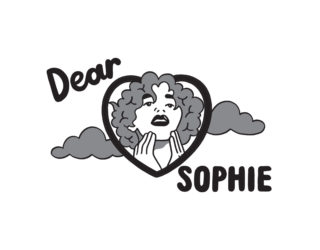When SOPHIE hooks up with vocalists they embark on mutual transformations
A relationships column - but one that's about relationships and music, not just bad sex and cheating partners

A relationships column - but one that's about relationships and music, not just bad sex and cheating partners
Relationship columns are unhelpful. We all know it. Each hot take is reductive and written under silly time pressures. They don’t let you read their messages? Dump that arsehole. They don’t mind your stubbly genitals? Keep that angel. They’re also ridiculously repetitive – come September, I can guarantee that every student paper will feature a column from a (single) relationship expert pontificating about the ethical dilemmas that come with dumping your high school sweetheart.
They’re also ridiculously fun. There’s a perverse pleasure in placing your trust in some randomer on whether you should break up with your spouse of five years. The only writing more likely to elicit such an emotional response is, um, art criticism. If relationship columns slant towards reductive naval gazing, a music writer like myself isn’t the best person to criticise. So why not double down and combine the two?
So yes, this is kind of a relationship column. ‘Relationships’ can mean many things within music. It’s the relationships artists write about. It’s how music reflects and affects our own relationships. It’s the collaborations, remixes, and influences that get the best music made. This month, we’re looking at the producer/artist relationship, and how SOPHIE continues to subvert what that dynamic should look like.
When the electronic cult hero released ‘Bipp’ in 2013, it felt like the arrival of a singular vision for pop – one that emphasised its artifice, sex appeal, and uncanny-valley emulation of actual emotions. Before long, it became apparent that SOPHIE’s vision wasn’t so singular after all. She found comrades as part of the PC Music collective, a label/artistic statement/buzzword making waves on the Internet.
Great music followed, with lots of thinkpieces lingering close behind. Like A.G. Cook, Kero Kero Bonito and all the other eccentrics SOPHIE was compared to, her music was wrapped in so many layers of irony that the Internet had a hard time telling what to take seriously. Was a song like ‘Lemonade’ making fun of chart music or embracing it? By the time the first longform project had rolled around, 2015’s ‘PRODUCT’, some had already written SOPHIE off as a bad joke about commodification.
Then SOPHIE started collaborating with Madonna and Kyary Pamyu Pamyu. Her elastic synths gave ‘Bitch I’m Madonna’ the edge its title sought, while the creepy/kawaii combo was a natural fit for an artist as unpredictable as Kyrary. This alien approach to dance music that had seemed so outside of mainstream acceptance complemented pop royalty from the East and West. SOPHIE’s evolved from underground idol to one of pop’s in-demand producers. Credits for everyone from Charli XCX to Vince Staples followed.
Something was different about SOPHIE’s status, though. While other bankable pop producers – Pharrell, Timbaland, Diplo, Jack Antanoff – are undoubtedly brought on board for their name-recognition as much as their signature sound, SOPHIE is uniquely picked for her philosophy.
Let’s start with Charli. With the PC Music helmed ‘VROOM VROOM’ EP, the chameleon pop star transformed herself again. This time, Charli became a pop diva cypher. The choruses were condensed into brash mantras. The grating edges of her voice were underlined with autotune. She struck gold when repeating the experiment with her following mixtapes, ‘Number 1 Angel’ and ‘Pop 2’.
Sophie produced the highlights. ‘Out of My Head’ marries the plastic quality of ‘VROOM VROOM’ with lyrics that border on Real Human Emotions. PC Music leader A.G Cook might have been the executive producer, but it was SOPHIE’s hyper-real sheen that was felt heaviest on ‘Pop 2’ – even the project’s title feels like an bold declaration for the shape of the genre’s future.
Then there’s Vince Staples, whose ‘Big Fish Theory’ combined blunt rap realism with a twisted electronic pallet in a biting vision of hip-hop to come. Naturally, SOPHIE was called upon for one of the ugliest cuts, ‘Yeah Right’, featuring Kendrick Lamar. Characteristically, the beat sounds like it’s floating in a vacuum. Warped percussion and murky bass are the only things to grip onto. It’s the kind of instrumental that anyone could sound menacing on. Staples has always had an ear for beats, but SOPHIE allowed him to emphasise the darkness within the niche he’d carved out for himself.
Indie-pop outcasts Lets Eat Grandma had a lot to live up to after releasing an oddball gem of a debut. Every music video is filled with two kinds of comments: “THIS IS SOOO GOOD!”, and “PLEASE DON’T SELL OUT!”, sometimes written as one scrappy sentence. The duo released ‘I, Gemini’ in their teens. They’re not yet twenty as they prepare to release a follow-up. SOPHIE wasn’t the obvious collaborator, but halfway through their new single, the producer’s unmistakable presence takes over. The chorus explodes. “HOT PINK!” yell the duo, their bratty vocals fusing with the gurgling production. Rather than selling out, the band embrace pop and satirize its stereotypes simultaneously with SOPHIE’s help.
SOPHIE’s production has been used by her collaborators to signify their own artistic transformations, and Let’s Eat Grandma return at the time when SOPHIE is making her own. ‘It’s Okay to Cry’, her first solo work in two years, marks the first time she’s shown her face in a video, boldly broadcasting her transgender identity in the process. Musically, the song is unmistakably SOPHIE – aggressive, tongue-in-cheek, a little bit creepy. But there’s a fresh confidence to her vocal presence. While her collaborators obscured their human presence to fit her style, she might have found a way to transmit her own by working with them.